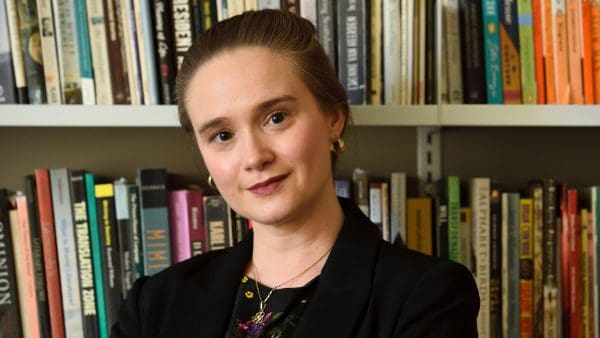Graduate student Elliot Turkiew’s area of study is molecular and cell biology. So it’s no surprise that he really likes to talk about genetics. What you might not expect, however, is hearing him speak extensively about the Hemerocallis, or daylily.
You see, Turkiew is an avid grower of award-winning daylilies. What started as a hobby when he was about 10 years old has blossomed into a full-fledged passion, as he’s created and grown some 1,200 hybrid daylilies.
Though he’d love to grow the perfect “Hopkins Blue” daylily, he’s had to abandon that dream—at least for now. “I realized that trying to do that would take so, so long because blue isn’t even in the current color spectrum for daylilies,” he says wistfully.
A native of Long Island, New York, Turkiew became interested in daylilies when his mother began growing them in the backyard. The youngest of four (he’s sibling to autistic triplets), Turkiew found that working in the garden gave him some quiet, quality time to spend with his mom. And soon he began growing his own collections of daylilies.
About a year later, at age 11, Turkiew helped set up the exhibition at the annual Long Island Daylily Society Flower Show. He also entered some of his own daylilies and ended up winning first place in the youth division. In 2006, he won the Christine Erin Stamile Award from the American Hemerocallis Society, which automatically gave him a lifetime membership.
In addition to the 1,200 hybrids he has created, Turkiew has grown about 500 named varieties of other hybridizers’ plants. “Anyone can produce a new hybrid,” he says. “The idea is to produce an improved or particularly distinctive hybrid.”
In 2007, Turkiew began serving as a judge at nationally accredited flower shows, and in 2010, photos of flowers from his personal garden were published in The New Encyclopedia of Daylilies. In the fall of that year, he started at Johns Hopkins, initially majoring in biomedical engineering but switching to molecular and cellular biology at the Krieger School in his sophomore year. At that time, his pursuit of the perfect daylily had to take a back seat to his rigorous studies. But every summer, he returned to Long Island to work on his garden.
Even though school has limited the time he can spend growing daylilies, Turkiew’s expertise has not dimmed. He spends his summers continuing his hybridizing efforts and training and appointing exhibition judges for flower shows.
Turkiew earned his bachelor’s degree last May in the Krieger School’s BS to MS program and is on schedule to receive his master’s degree in May 2015.
He says his studies at Hopkins have informed his work with daylilies. “I’ve always been interested in complex genetics,” he says. “Some of my studies have given me a greater understanding of the hybridization process of daylilies.”
For all the time and effort aficionados like Turkiew put into creating and growing daylilies, their beauty is fleeting. It takes about two years for daylilies to go from seed to flower. And their peak bloom? That lasts just a few days.




